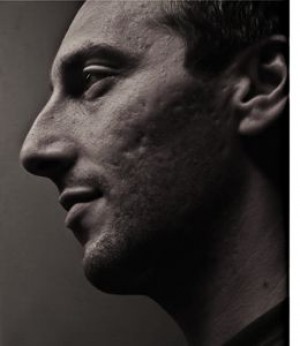The Timing of Transformation: A Record Makes Its Way Back To the Top of the Stack
This review should have run ages ago. I’ve had Spirit Transform Me for over a year. I wrote notes on the record last winter, with an eye to publishing something in early 2009. And then, after being postponed a few times, the CD disappeared. While this wasn’t really a case of something being out of mind because it was out of sight – I looked for it periodically – my resolve to finish the review slackened. Even though I had listened to the album with great interest and was ready to sing its praises – the pairing of Oren Ambarchi’s ambient explorations with z’ev’s edgy percussion is brilliant – it became less and less of a priority.
Anyone who has worked as a regular music reviewer knows how difficult it is to keep the stack of records to be reviewed at a manageable height. Time-sensitive assignments, which bypass the pile, further complicate matters. That’s why, despite their best efforts, critics inevitably overlook material they had every intention of reviewing. The stack tips over, its contents are dispersed, and a record that had seemed like a sure-thing one month migrates to a location where it is likely to languish until the reviewer carts his latest box of review copies to the nearest store that traffics in previously owned merchandise.
At least, that’s how the fate of unfortunate records played out when review copies were still being mailed in large numbers. With the music industry’s precipitous decline over the past decade, together with the normalization of digital content, the record that misses its opportunity to be reviewed these days may well be consigned to the hard drive or e-mail archive rather than the box of discs that missed the cut.
Because I’m less inundated with freebies than I was in the early 2000s, I try hard to show review copies the respect they always deserved, but which I only now have the time to offer. Even when the schedule is full, I make it a point to listen to each record I’m given, whether in CD or digital form. That way I can at least perform the basic work of filtering material with potential from the sort that I have no interest in reviewing.
It’s my feeling that, given the limited space that Zeek has for discussing musical content, everything that we review should be both good – recognizing how difficult it is even to simulate objectivity on matters of taste – and worthy of thought. And I also think it important, given those constraints, that we not feature the same kind of material too often or too close together.
I can’t remember exactly what led me to put off my review of Oren Ambarchi and z’ev’s collaboration a year ago. Maybe it was my sense that we needed to run more accessible content. Or perhaps it was aftermath of the IDF’s operation in Gaza, which made esoteric music invoking Kabbalah seem strangely out-of-sync with the cultural mood. Whatever the reason, I delayed my review long enough to lose track of what I was reviewing.
To find it the other day, then, as I did while sorting through a pile of what I had thought were reject review copies, inspired enough guilt to make spiritual transformation seem like a medical necessity rather than just a worthwhile aspiration. I popped the CD in my player and started listening to it as a soundtrack to the Charlie Chaplin silent films that I’d recently received as a gift. The resulting synergy, though almost certainly not what the Spirit Transform Me’s creators had in mind, was breathtaking.
I don’t normally listen to material I’m planning to review as “background” to some other activity. Part of being a good critic means focusing intently on one’s subject. But there’s something about Ambarchi and z’ev’s collaboration, with its roots in trance and ambient music, that makes ad hoc montage curiously appropriate. One way to think about work of this nature, with its lack of melody and wariness of regular patterns, is to regard it as invitation to tear down the walls created through the division of mental labor. The spirit, in this interpretation, manifests itself in the urge to see and hear the manifold varieties of experience as components of a singular whole.
While there’s nothing wrong with this analysis, however, it doesn’t explain why the record would couple more effectively to some content than other. Why not put the CD on during a muted viewing of ESPN’s Sports Center or a rerun of The Family Guy? Montage is always more personal that its theorists have been prepared to acknowledge, an invitation to free associate in ways that are difficult to share with anyone else. So the pairing of Charlie Chaplin films with Spirit Transform Me resonated for me with greater force than they likely would have for anyone else. That said, though, there’s something about the way the record sounds, particularly during the middle movement “Bet”, that makes Chaplin’s comically exaggerated reenactment of everyday triumphs and insults seem like the key to a deeper understanding of the mysteries of creation.
Because Chaplin’s films date from a period when the medium of cinema was still unstable, flush with both the thrill and fragility of youth, they remind us how even the simplest forms of language, in which facts and feelings are often communicated awkwardly, are suffused with wonder. Indeed, this inarticulate expression – and I’m referring here to cinematic language, rather than Chaplin’s finely tuned physical humor – is capable of moving us in a way that the more fluent sort cannot. Like the first sounds from a person who has temporarily lost the power of speech, such laborious stammering testifies to the miracle of languages we blithely take for granted. We perceive how far we come and how bereft we would be if that progress were undone.
In my original notes on Spirit Transform Me, I approached these questions from a more conventional engagement with the legacy of Kabbalah, trying to capture the way in which the rumbling sustain and scratchy found sounds that Ambarchi and z’ev weave together lure listeners in to discover a meaning that keeps getting deferred. I can still hear the album along those lines, if I concentrate. But my dominant impression of it now, in the wake of its pairing with Chaplin, is not of postponed revelation so much as the insight that what is to be revealed was never hidden in the first place.
This isn’t music you can jog or bicycle to. It’s not music to make you dance. It may not even merit the term “music” in your dictionary. Even so, I find it difficult to imagine someone listening to Spirit Transform Me without feeling the injunction to reshuffle priorities. Something is pushing forward in its mélange of sounds, something that demands expression, even though it resists logic. I don’t want to sound too much like the New Age mystics who used to make me cringe, but I can’t help but believe that the record’s disappearance and unexpected return, right as I was going to sit down and watch those Chaplin films, was an example of the spirit the title invokes working its magic.
![[the current issue of ZEEK]](../../image/2/100/0/5/uploads/leftistethicistgraphic-52842c6a.png)
- 5000 Pages of Zeek
- Founded in 2001, Zeek was the first Jewish online magazine, and we have over 5000 pages online to prove it, all available free of charge. Read more in the Archive.
More articles by
Charlie Bertsch
More articles in
Arts and Culture
- Euphoria, Curiosity, Exile & the Ongoing Journey of a Hasidic Rebel: A Q & A with Shulem Deen
- Poet Q, Poet A: Jews Are Funny! Six Poets on Jewish Humor, Poetry & Activism and Survival
- Tackling Hate Speech With Textiles: Robin Atlas in New York for Tu B’Shvat
- Fiction: Angels Out of America
- When Is an Acceptance Speech Really a Speech About Acceptance?




